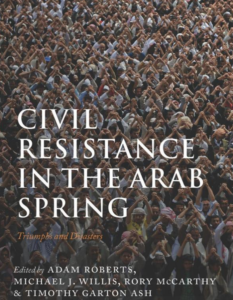 Nonviolent movements make democratic transitions more likely and lead to stronger democracies, according to a new analysis by Jonathan Pinckney of the International Center on Nonviolent Conflict (downloadable here).
Nonviolent movements make democratic transitions more likely and lead to stronger democracies, according to a new analysis by Jonathan Pinckney of the International Center on Nonviolent Conflict (downloadable here).
Drawing from decades of data, refined statistical analysis and in-depth case studies, the monograph identifies the role of civil resistance in maximizing democratic consolidation and addresses why some nonviolent revolutions lead to successful democratization and others do not, the ICNC adds. It further shares insights about what activists and their allies, including members of the policy community, can do to increase the odds of successful democratic consolidation.
 How can external actors interested in helping nonviolent movements apply the study’s lessons? the study asks:
How can external actors interested in helping nonviolent movements apply the study’s lessons? the study asks:
- The first way is to exercise more caution. External actors should be careful to give local movements the flexibility and autonomy that will allow them to remain intimately connected to the needs, desires, and passions of their local constituencies. Long-term mobilization is best served by grassroots initiatives from people who understand and are deeply connected to their local context.
- However, external actors may play a role in helping activists think through the potential challenges that may arise once they have brought down repressive political regimes. Sharing principles of careful strategic planning, preparation for maintaining mobilization once the old regime is no longer in power to keep people engaged, as well as technical training and preparation for the complex questions of arranging new constitutional structures may all be helpful interventions.
Join ICNC and the U.S. Institute of Peace for a presentation by Dr. Pinckney followed by a panel discussion. The event will provide key takeaways for activists, organizers, scholars, and people interested in supporting nonviolent movements, particularly prior to and during democratic transitions.
Featured Speakers
Dr. Jonathan Pinckney, author
Research Fellow, International Center on Nonviolent Conflict; Post-Doctoral Research Fellow, Norwegian University of Technology and Science; and External Associate, Peace Research Institute of Oslo.
Dr. Maciej Bartkowski, moderator
Senior Director, Education and Research, International Center on Nonviolent Conflict
Dr. Maria Stephan
Director, Program on Nonviolent Action, United States Institute of Peace
Dr. Nancy Okail
Executive Director, The Tahrir Institute for Middle East Policy
 Melinda Haring
Melinda Haring

 Editor, UkraineAlert blog at the Atlantic Council and fellow, Foreign Policy Research Institute
Editor, UkraineAlert blog at the Atlantic Council and fellow, Foreign Policy Research Institute
Wednesday, October 10, 2018
10-11:30am EDT
U.S. Institute of Peace
2301 Constitution Avenue, NW
Washington, DC 20037







